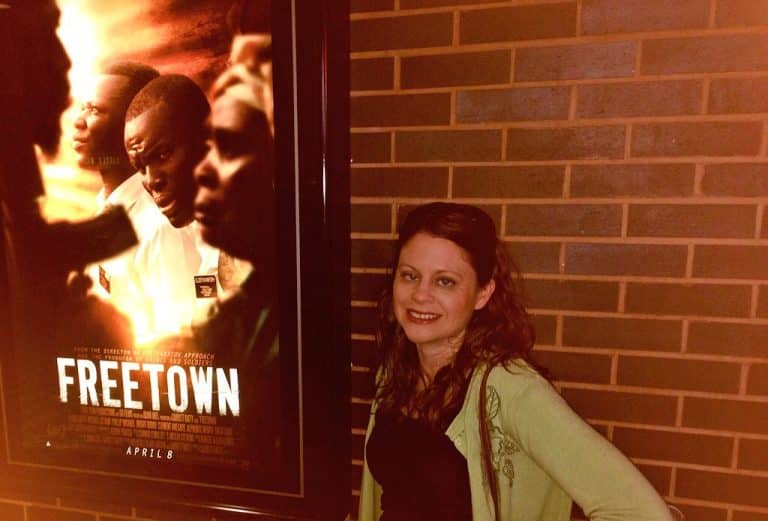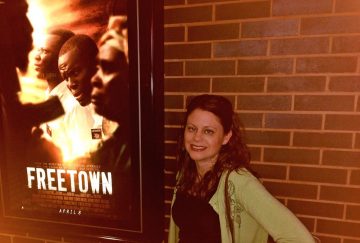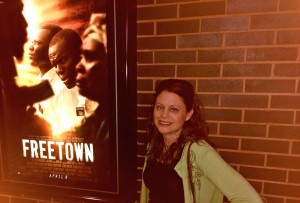I recently attended the preview of Freetown, a new Mormon genre movie about—you guessed it—male missionaries. I was hoping it would be a quality film—and it was—but I didn’t hope to see anything I hadn’t seen before. I’ve seen a lot of movies about male Mormon missionaries already (God’s Army, The Other Side of Heaven, The Best Two Years), not to mention the fact that I know a bunch of Mormon missionaries in real life and served alongside dozens of them when I was a missionary myself.
However, Freetown managed to bring something new to the genre that I personally hadn’t seen yet: it is not an American story. It doesn’t take place in the U.S., nor does it document an American missionary’s culture shock as he adapts to living in a distant land. With one very short-lived exception, Americans are not in this movie. Let me repeat that: this Mormon movie is not about Americans! The movie takes place in Liberia in 1990, at the beginning of a civil war. It centers around six native Liberian missionaries attempting to escape their war-torn country.
I think that the opportunity to see our faith through the lens of another culture; without a familiar, American character to use as a cultural translator/crutch; is reason enough for American Mormons to see this film. However, I should warn our feminist readers that, in keeping with Exponent tradition, I applied the Bechdel test to Freetown and it failed miserably. To pass the Bechdel test, a film must:
- have at least two female characters
- who talk to each other
- about something other than a man.
This movie didn’t even make it through Criterion Number 2. I never once saw two female characters speak to each other over the course of this film.
To the filmmakers’ credit, the few female characters who did make appearances were portrayed as strong people in their own right and not as mere props for the men. However, these appearances were always short and most scenes had no women at all.
Of course, as any Mormon knows, the real-life rules governing male missionaries don’t leave a lot of room for incorporating women into their lives. The film promotional materials boast that Freetown comes from the makers of the Saratov Approach (also about male missionaries) and Saints and Soldiers (about male soldiers), so it appears that these filmmakers have specialized in movies about Mormon male characters in masculine situations absent of women. There is nothing wrong with them choosing to specialize this way, but if you already feel satiated on stories of Mormon masculinity from Sunday meetings, Freetown may not be the best way to spend your entertainment dollars.







17 Responses
Great review, April. My interest is peaked in the film — but how disappointing they didn’t do more with women!
So that review covered what wasnt in the movie. What about a review of what the movie covered: relationships, feelings, faith in adversity…anything?
This was certainly not a comprehensive review. I only touched on what I saw as its greatest strength (telling a Mormon story from a non-American perspective) and its biggest weakness (no women). I would recommend seeing the movie if you are interested in learning more about it. It opens next week.
I’m very interested in seeing this, April! Thank you for the review!
I like the idea of this film, but I think I would hunger more for it if films like this were in a selection of other films depicting Mormon female missionaries. I think the news is a bit odd in telling the stories of sister missionaries as well– when those elders in New mexico were held captive, it was all over the news that they went proselyting the next day. But the sister missionaries in a friend’s South American mission — who were kidnapped and the Mission president had to drop ransom money off– weren’t even in the news.
I think it reflects the idea that the experiences of women are NOT a “missionary tool”…. and as such, reveals that hierarchy might subconsciously know that the position of women within the church is not something to shout about.
[…] missionaries are going to survive,” and her Q&A with the director was really insightful. April Young Bennett of the Exponent had a chance to see it as well, who noted that while the absence of Americans in the film made it […]
Thanks for the review. I’m interested in seeing it too!
Does anyone know of films in the works of companies working on Mormon women’s stories? I know a number of people who’d support such things, but I’ve no idea where to even hear about them.
Hello April. Thanks for your review. Just wanted to say Hi! And mention that I, a woman, wrote the screenplay for FREETOWN. Normally I’m known for writing strong and interesting roles for women; I’ve got 13 plays full of them, including one opening in Salt Lake City in two weeks. I do have several new films in the works, all of which have great roles for women (including one about sister missionaries).
FREETOWN is an historical piece. We are telling a true story and, as you say, there isn’t a lot of room in a story about male missionaries for women. That’s just how things are. So when Garrett approached me about writing the film, I took it as a challenge: a chance to dispel the stereotype that women can’t write men well. Do I want to see and make great films about women? You bet. Do I regret contributing to FREETOWN? Not at all.
Thank you for commenting Ms. Larson! I actually have a ticket to see your upcoming play, Pilot Program, and I am looking forward to it. I enjoyed Freetown. As I said, I thought it was a quality film. It is good to know that you are also working on projects about women.
I’m so excited about the movie about sister missionaries, and even moreso because it is being written by a woman! Perhaps you might consider a guest post about women writing for male actors sometime?
Sure. I don’t think it would be a terribly long post, though. 😉
This film was written by a woman who nearly always writes scripts about strong women, which scripts nearly always pass the Bechdel test. And, I confess, I’m rather disappointed that you didn’t even mention that it was written by a woman. That’s a big damn deal, in my opinion. A movie about not American Mormons written by a woman!!!
Melissa was not the producer, in fact, she was asked to write the script for an already planned, true story. How great would it be if those with the money would pick up one of her AMAZING scripts (I’ve seen a fair few of her productions) and make that into a movie! Her name is out there in filmmaking, let’s give her credit for her beautiful writing and support the production of her female centric scripts.
PS-I just saw she posted, but I’m going to post anyway…
Thanks for the review! I can’t wait to see this movie, my family lived in Liberia in the early 80s and I love the country and the people. Along with a German family, we were the only LDS people in the country at the time.
Wow! What a unique experience to be one of only two Mormon families in an entire country!
“Once I Was Beehive” (AKA “Girl’s Camp Movie”), to come out in late 2015, is one to look for. There are some talented people involved, including the very funny Lisa Valentine Clark, who is staring and is a co-writer. https://www.facebook.com/GirlsLoveCamp
In the past, there was The Errand of Angels, about sister missionaries in Vienna, directed by Christian Vuissa.
I think the Bechdel Test is good for looking at overall trends, but not as useful for examining individual movies.
[…] it is an Exponent tradition to include the Bechdel test in movie reviews. There was a minor outcry the last time I reviewed a movie because some did not like that I applied the Bechdel test to the film. They pointed out to me that […]
[…] wonder if the distributors are mad at me because no one liked my review of Freetown? It’s odd, because I liked Freetown and I thought I gave it a good review but it seems that I […]